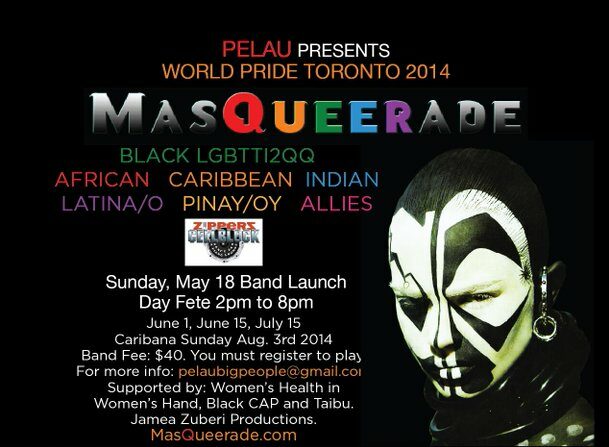Here’s what happens when Pride and the Caribbean diaspora intersect
Professor R. Cassandra Lord speaks about how the Pelau MasQUEERade helps disrupt normative notions of Pride by creating a space for queer people of colour.
Professor R. Cassandra Lord’s upcoming book “Performing Queer Diasporas: Friendships, Proximities, and intimacies in Pride Parades” focuses on Pelau MasQUEERade, a Caribbean queer diasporic group that participated in Toronto’s annual Pride Parade from 2002 to 2014. After becoming a member of the group in 2004, Pelau MasQUEERade became a subject of Professor Lord’s ethnographic research—comparative studies focusing on people’s habits with particular attention to culture, traditions, and heritage—in 2005.
The name “Pelau” stems from the cooked rice dish originating in Trinidad and Tobago. The meal is cooked in a single pot with chicken or beef, rice, peas, vegetables, herbs, and spices. The beauty of Pelau is that depending on where you eat it, who cooks it, and what type of ingredients are used, the dish is always unique. This diversity is the essence of Professor Lord’s examination of Pelau MasQUEERade in Toronto.
Professor Lord shares that “The book is a re-working of my dissertation’s field work. When you have a question, it preoccupies your mind for a very long time. Writing takes time and thinking takes time.” She continues by saying, “The work has evolved since then.”
For years, Professor Lord analyzed de-racialization patterns of queer histories and white homo-national narratives that routinely removed people of colour from queer spaces. The existence of Pelau MasQUEERade confronted those non-inclusive ideas by creating a space for queer people of colour within Pride.
“The larger question was: How do queer people of colour make meaning in the Pride Parade?” says Lord. “[Pelau] re-imagines a belonging in Pride on their own terms that seeks to bring the Caribbean into Pride through the idea of carnival,” she explains.
Pelau’s practices draw on Trinidad and Tobago Carnival. First repurposing clothes worn during the carnival for their masquerades, Pelau had to switch to painting participants’ bodies and wearing earthy tones as a result of low funding. Professor Lord describes this act as a “queer-making practice.” However, she stresses “We have to change our mind about what is queer. It’s not queer because the people doing it are queer, but because it allows us to re-imagine forms of being and belonging.”
Professor Lord followed Pelau’s early conceptions, observing how participants interacted within the queer diasporic space by embracing the need to be and share their whole selves. Professor Lord sought to understand the formation of Pelau MasQUEERade in the context of Toronto, where different histories and diasporas cross in identifiable ways. Studying the transcripts and narratives presented in her research, she discovered the recurring theme of friendship. A deep sense of knowing someone is what made Pelau a group of non-Caribbean and Caribbean people committed to bringing Carnival to Pride.
Those invested in Pelau MasQUEERade showed the importance of creating relationships with other people of colour and acted as a model to confront white supremacy and interrupt white spaces. “Once you know someone, you can go to the places that are difficult. Friendship allows people to [connect with] each other. It’s not an intimacy of knowing that is without fractures and faults,” explains Professor Lord. Rather, “it allows people to push the limits of their friendships and talk about things they may not want to say,” she emphasizes.
“What endeared me is the feeling of going to Pride and listening to trucks with big sound systems,” shares Professor Lord. This included Trinidadian pop music used in carnivals. “Soca music in the context of Pride,” she elaborates. “I was intrigued by people going to Carnival in the diaspora. Moving back and forth between spaces and reworking costumes to fit different bodies.” Professor Lord describes the experience of observing a performance by Pelau MasQUEERade as “the day that you’re going to be swept away by the music because you’ve never seen anything like [it] before.” She continues, “When Soca music is reconfigured in a queer space it does something. The instruction and movement. Back, forth, left, and right. Is this Pride? Is this Caribana?”
While participating in Toronto’s Pride is an empowering act, Pelau MasQUEERade identified its missing flavour and gathered ingredients to create a space for queer people of colour. Without this disruption of queer white spaces, people of colour are often evicted resulting in “a history of disappearance,” as Professor Lord describes. To conclude our conversation, Professor Lord explains what she aims to achieve with her book. “[Queer people of colour] have always been there, but there was no documentation. It’s about writing yourself into the history—‘queering’ history,” she finishes.

